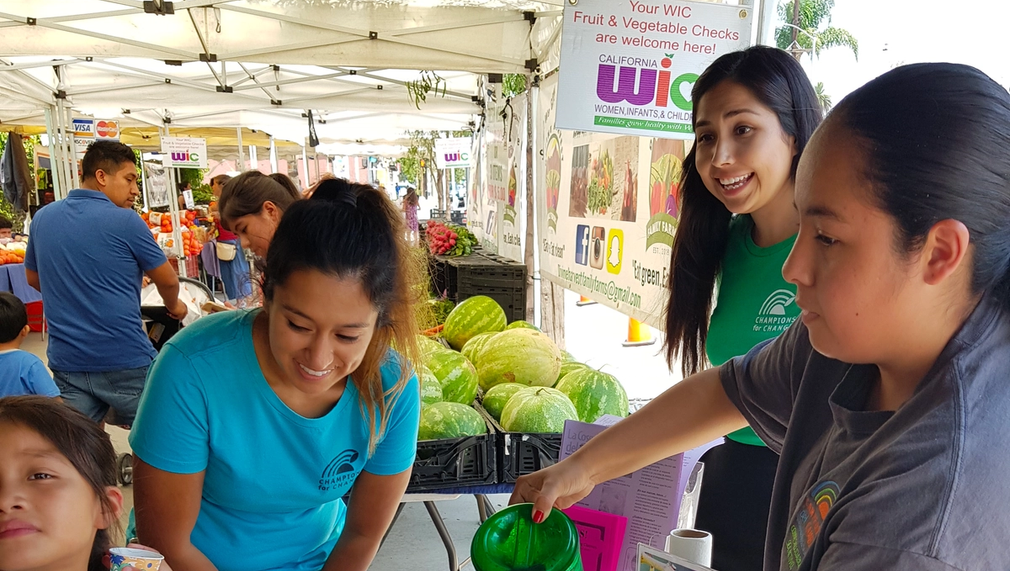Empowering Youth through STEAM Culinary Education
SEE-LA will develop and provide bilingual English/Spanish STEAM Kids’ Culinary and STEAM Kids’ + Caregiver series within the South LA community. Each four-part series builds on key math and science STEAM objectives through hands-on culinary skill development empowering youth (6-17yoa) and caregivers to confidently prepare meals on their own and with members of their households. Classes uniquely focus on California-grown produce and are hosted at two farmers’ markets as well as community sites, including foster care centers and group homes.

What is the primary issue area that your application will impact?
K-12 STEAM Education
In which areas of Los Angeles will you be directly working?
South LA
In what stage of innovation is this project, program, or initiative?
Pilot or new project, program, or initiative
What is your understanding of the issue that you are seeking to address?
We seek to address health disparities for low-income youth in South Los Angles through K-12 STEAM education activities for Foster and Systems-Impacted Youth. There are currently 35,000 children in Los Angeles foster care. The Journal of Pediatrics found that kids who grew up in the foster care system experience preventable, chronic health problems like diabetes, hypertension, and asthma at a rate significantly higher than the general population, including among low-income individuals who did not grow up in foster care. Young people in foster care lack autonomy in food preparation. Though nutritious food is a vital preventive health resource, how and what foster youth eat depends on their agency’s priorities. They rarely receive guidance on how to prepare and shop for nutritious meals on a budget. Studies have shown implementation of culinary skills at an early age has proven to have a significant impact on improved nutritional intake and can exhibit substantial health benefits.
Describe the project, program, or initiative this grant will support to address the issue.
SEE-LA’s Nutrition Education team will develop and provide a four-class bilingual English/Spanish STEAM Kids’ Culinary series (6-17yoa) and STEAM Kids’ + Caregiver series. SEE-LA’s classes uniquely focus on California (CA)-grown produce while integrating key STEAM learning objectives through hands-on culinary arts. STEAM math objectives include the use of measuring instruments and fractions, sequencing by following a recipe, and adding and joining through combining ingredients. Kids will learn the science of cooking, study the different states of matter, learn about the life cycle of plants that yield fruits and vegetables, and how to use simple machines like blenders. Both series will have 30 minutes for learning activities and 30 minutes for direct hands-on recipe preparation. Classes will be in SEE-LA’s two South LA farmers’ markets, connecting students to CA growers, fresh and affordable produce. SEE-LA’s markets accept WIC, EBT, and have a Market Match program to enhance affordability. Classes will also be coordinated with and conducted at local South Los Angeles schools and foster youth centers and group homes. The program design addresses issues faced in access to K-12 STEAM education and life skills readiness of foster and systems-impacted youth in South LA through enabling community based, interactive STEAM learning with practical cooking skills development to promote increased confidence in fruit and vegetable preparation.
Describe how Los Angeles County will be different if your work is successful.
In the year, SEE-LA envisions success in the delivery of 16 four-part class series, 8 for kids and 8 joint kids and caregivers, to a total of 160 unduplicated students. Upon completion of series, we see students achieving measurable change in STEAM objectives and increased confidence in their ability to prepare recipes within their age capabilities. We envision empowered youth and youth and caregiver units preparing more meals using CA-grown produce, benefitting their health and wellbeing. We expect to see measurable change in caregivers’ inclusion of kids’ support in preparing meals together. SEE-LA’s STEAM Culinary curriculum will add value to the South LA community and can continue to be an ongoing SEE-LA farmers’ market and community program, beyond the grant term. SEE-LA sees success in refining the curriculum based on student feedback to strengthen its impact and enable SEE-LA to expand the curriculum at other SEE-LA farmers’ market locations as well as with community partners.
What evidence do you have that this project, program, or initiative is or will be successful, and how will you define and measure success?
In collaboration with STEM to the Future, a kids’ STEAM program, SEE-LA provided 10 culinary classes, informing the development of our first STEAM cooking classes. One parent noted, “He [student] looks forward to his Wednesdays and wants to repeat recipes at home. This has been a very exciting experience for us both.” Partner org staff reported that kids enjoyed the class, showed progressive learning, and requested SEE-LA back to continue classes. Qualitative feedback from students showed they enjoyed sharing the recipes with family and increased participation in family meal preparation. Impact will be measured by pre/post series surveys and weekly objective attainment tracking. The following will be observed: rate of students' support in meal preparation, confidence in doing culinary tasks, intent to consume fruits and vegetables, ability to measure, sequence, and add, and ability to perform food science by fermentation, physical science, life science, and use of simple machines.
Approximately how many people will be impacted by this project, program, or initiative?
Direct Impact: 160
Indirect Impact: 360